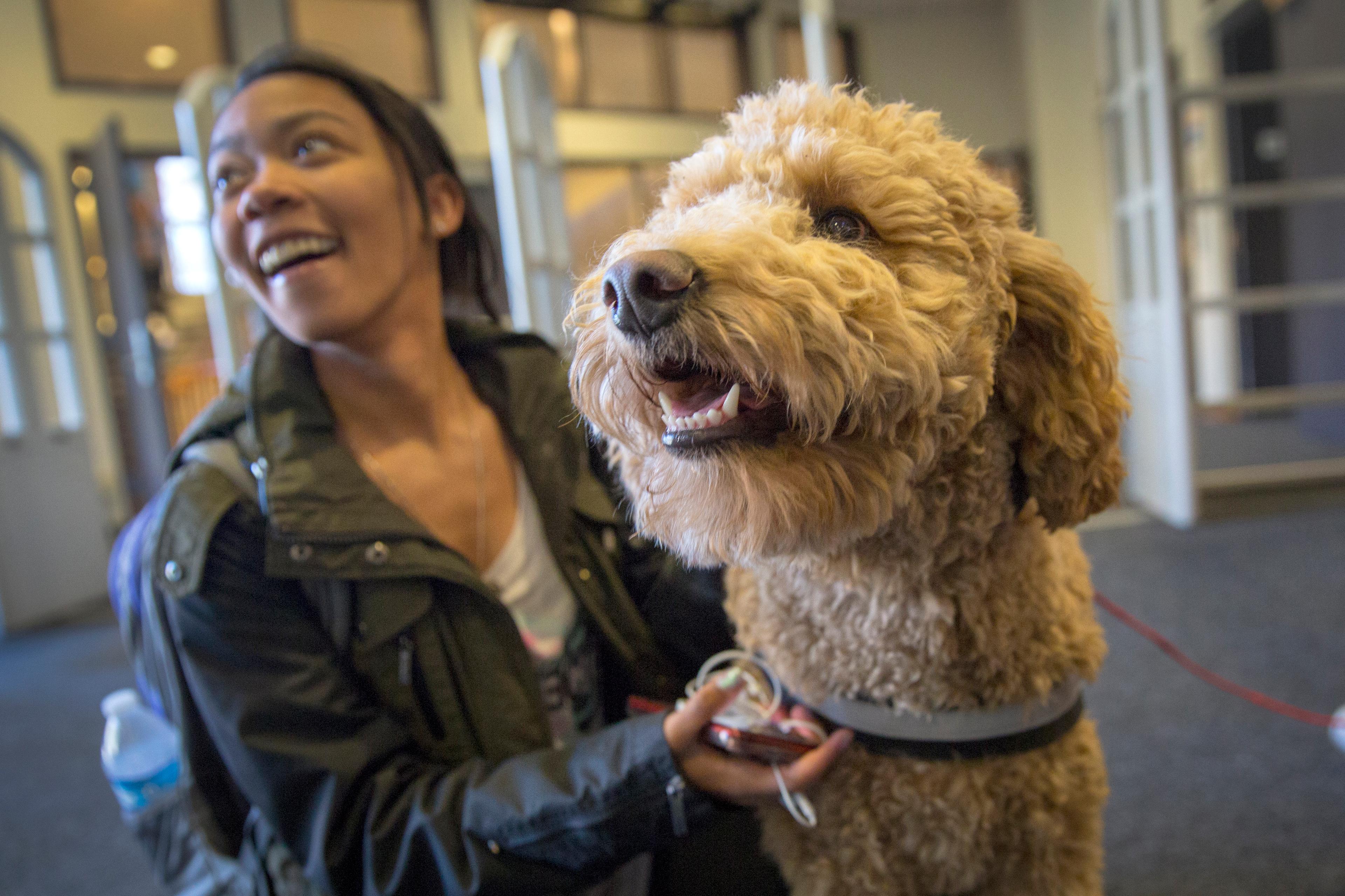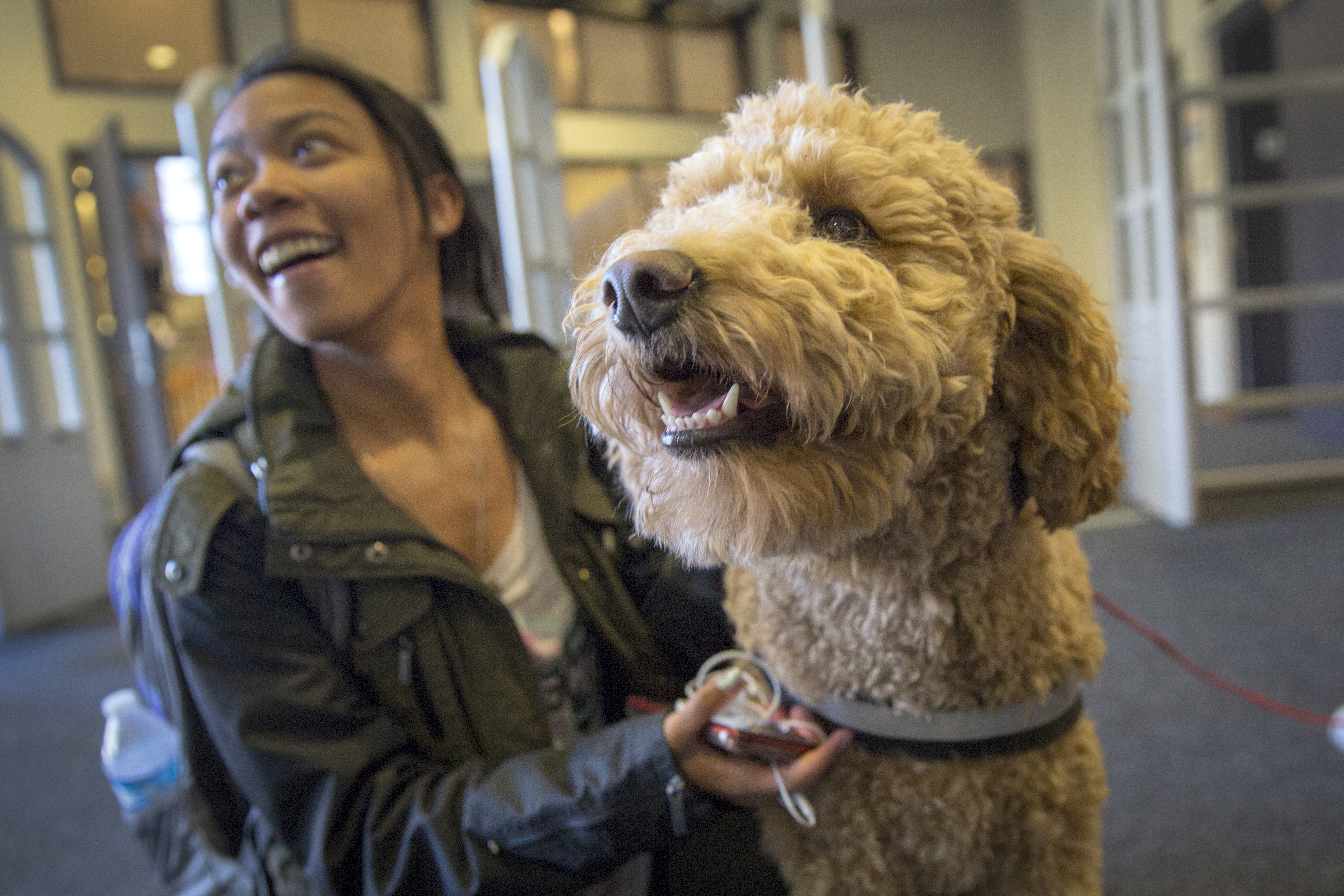

It’s finals time at the University of Colorado Boulder. Naturally, tensions run high during the traditional cram session. Some students bite their nails, many nurse an extra cup of coffee.
For freshman Sravya Dhanwada, a biology major, it’s the “final frenzy” before the break.
“The student atmosphere, where people if they’re stressed out they’ll talk about it a lot,” she said. “They’ll tell everyone about their stress and then everyone else will get really stressed, so it’s a ripple effect.”
There’s a good-looking popular guy with wavy brown hair and a sparkling personality on campus who can help with the tension. Don’t fret students, Toby the two-year-old goldendoodle has got this.
“They have Toby Time slots where students can just come in and hang out with him for a little bit if they want to cool down or need a break,” said sophomore Julianna Rohn. “He’s pretty great. He’s super sweet!”

Toby, one of two pilot therapy dogs in the Counseling and Psychiatric Services program, is the good-natured side of a serious challenge on college campuses around Colorado. Over the last decade, student use of the school’s counselors skyrocketed by 230 percent, said Monica Ng, the director of the counseling and psychiatric services program.
“Across the nation, the demands for mental health service has increased significantly and a lot of our students go through a lot of stress,” Ng said.
According to the CAPS program, daily walk-ins have increased from an average of 25 a day in 2017-18 to 39 a day so far in the current academic year.
Back during the 2007-08 academic year, CU’s counseling and psychiatric services program recorded more than 12,000 appointments with counselors. Ten years later that number more than tripled to about 41,000 appointments.

Ng attributed the sharp increase to “a generational shift.” She said younger people today are more open to seeking help when they need it, and there is less stigma about seeking mental health services. Additionally, many students come to college campuses having already experienced counseling and/our therapy sessions in high school.
Toby’s main role at CU is to help put students seeking counseling at ease. Megan Shih, Toby’s owner and one of the counselors at the center, said he might join a group session or help break the ice when a counselor is working with a student one-on-one.
For her, canine therapists are a “really creative way to kind of break up the rhythm.” Also, CU’s counseling program is able “to offer something to those students who might not be comfortable with coming in and sitting face to face across from someone and having talk therapy,” she said.
Counseling director Monica Ng said the special nature of dogs — they’re “just so loving and they’re very intuitive” — makes them useful for counseling.
“I have heard stories from our therapists where students come in, they’re feeling anxious,” she said. “And the dog literally leans in to them to comfort them.”

Some people don’t like dogs, others have allergies, so there were some details to work out when the program started. But Ng said the mental health benefits are already considerable.
“There’s been a lot of research on the medical side in terms of you know having animals, touching animals, petting animals, lower blood pressure, decreased anxiety,” Ng said. “All of which are wonderful for counseling.”
Students have asked for an additional smaller dog to be added to the canine therapy dog lineup. Ng said the canine therapy program costs are essentially zero because the dogs all belong to employees who are volunteering their dog’s time. CAPS also plans to provide more staff training and bring canine therapists to more campus outreach events.

As a mental health ambassador at CU Boulder, Toby hangs out around campus in spots like Norlin Library, clad in a green vest that proclaims “therapy dog.” Student Julianna Rohn said anything that helps students to feel comfortable and get beyond the stigma of seeking help is a good thing.
Rohn sees Toby and his fellow therapy dog as a stress reliever, something to “get your mind off of what’s going on, especially during finals week and stuff like that.” Plus, as CU’s Director of Health Promotion Leisha Conners Bauer asked, “Who doesn’t like a dog?”









